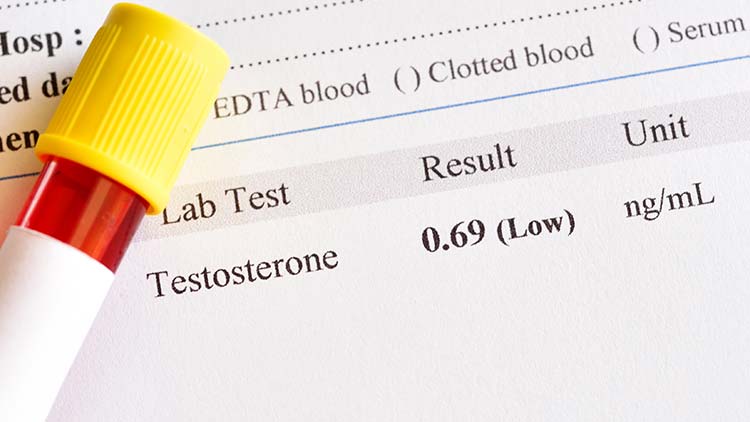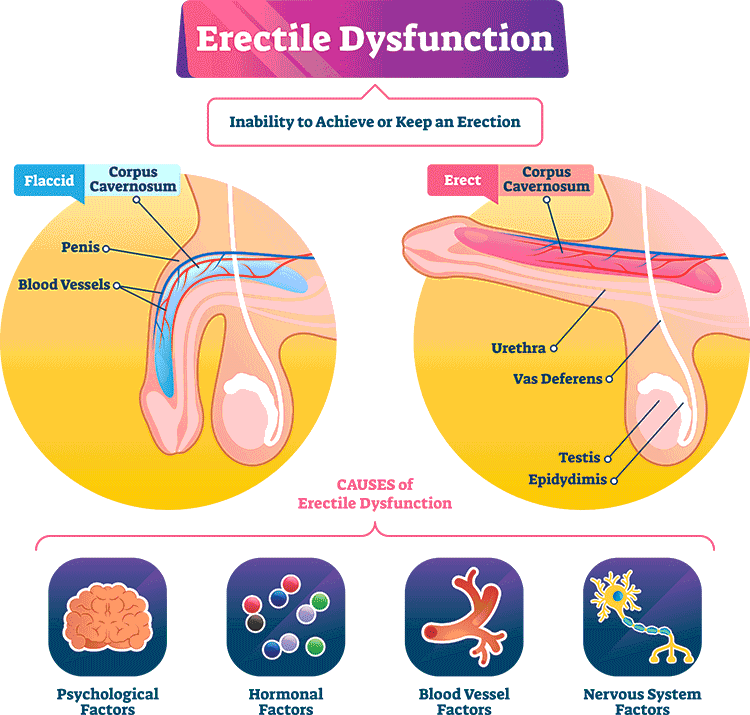It’s easy enough to decide whether or not you have erectile dysfunction. If you have a hard time getting or keeping an erection for long enough to satisfy yourself or your partner, then there’s reason to suspect that you might have ED.
What’s a little bit less easy to determine is the cause of your erectile dysfunction. ED can be caused by physical and psychological factors: diseases, anxieties, and the like. It can also be a sign of other underlying conditions.
In this article, we’ll briefly touch on what erectile dysfunction is before discussing some of the most common causes of ED. In the end, we’ll discuss some of the potential treatments for this condition.
- Different Causes of Erectile Dysfunction
- Erectile Dysfunction Caused by Medical Conditions
- Prescription Drugs That May Cause ED
- Recreational Drugs
- Should You Avoid Cycling?
- Psychological Erectile Dysfunction Causes
- Common Causes of Erectile Dysfunction In 20ss
- Common Causes of Erectile Dysfunction In 40s
- Available Erectile Dysfunction Treatment
Different Causes of Erectile Dysfunction
How do you get erectile dysfunction? There are lots of different answers to this question, ranging from medical conditions and the medications used to treat them, to psychological issues and lifestyle choices. In this article, we’ll discuss some of the most common issues that can lead to ED.
Erectile Dysfunction Caused by Medical Conditions
If you are wondering what causes erectile dysfunction, you might be surprised to learn that some of the causes seemingly have nothing to do with sexual health. In fact, in some cases, erectile dysfunction can be an indicator of another health problem. These are some of the most common health problems associated with ED.
Cardiovascular Diseases
As you probably know, an erection is caused by blood flowing into the penis. Here, it fills up the soft tissues of the penis, leading a man to get an erection.
The cardiovascular system – composed of your heart, veins, arteries, etc – is responsible for this blood flow. If your cardiovascular system is not in good shape, then you will have trouble successfully getting blood to flow to your penis.
- Atherosclerosis, a problem caused by the buildup of cholesterol and eventual hardening of the arteries, can lead to high blood pressure and make it hard to get blood to flow through the body.
- Hypertension, or high blood pressure, can be caused by a number of things and can make it very difficult for a man to get an erection.
Hormonal Problems
Hormonal problems can also lead to difficulty getting or maintaining an erection.

Thyroid conditions, testosterone deficiency or excessive amounts of estrogen can make it hard for men to get erections.
Diabetes
Diabetes is another condition that can lead to the development of ED. Diabetes can cause high blood pressure, which can contribute to ED on its own. Diabetes and high blood pressure can also both contribute to atherosclerosis which can aggravate or cause erectile dysfunction.
Obesity
Obesity is another health problem that is often linked to erectile dysfunction. If you are struggling with obesity, you may be prone to developing high blood pressure. You may also be more likely to develop diabetes. As mentioned above, both of these issues can lead to ED.
Neurological Diseases
Neurological and degenerative diseases, such as Parksinson’s and multiple sclerosis, can both contribute to erectile dysfunction. However, if you are struggling with a serious neurological disease, there are most likely other significant symptoms.
Prescription Drugs That May Cause ED
Many prescription drugs are also capable of causing ED. In fact, many of the drugs which are used to treat the conditions above can also contribute to ED. Here are some common drugs which may cause problems with male sexual health.
- Drugs that affect blood pressure or the heart
- Anything that affects the central nervous system, be they stimulants (like amphetamines) or depressants (like benzodiazepines)
- Anxiety medications, like benzodiazepines, often suppress the nervous system and engage the parasympathetic nervous system which can make it difficult to maintain an erection
- Common antidepressants such as MAOIs, SSRIs, and tricyclics
- Opioids like morphine
- Drugs that affect the prostate
- Anticholinergic drugs
- Any drugs that affect the hormonal system
Recreational Drugs That Can Cause ED
Recreational drugs are also notorious for causing erectile dysfunction. Fortunately, if the cause of your ED is a recreational drug, the problem will generally only last as long as the drug is taking effect.
Alcohol
You have probably heard the term ‘whiskey dick,’ which accurately describes a situation in which a man is unable to get an erection after consuming alcohol. Some men only experience ED after consuming large amounts of alcohol, whereas others may experience it after only a few drinks.
In some cases, alcohol-related ED may persist into the morning after. It rarely lasts for more than 24 hours after consuming the last drink.
Amphetamines
Amphetamines and stimulants such as cocaine are a class of drugs that stimulate the central nervous system, providing a significant boost of energy. In doing this, they also significantly raise blood pressure, which can make it difficult for a man using these drugs to maintain or get an erection.
Opioids
Opioids are central nervous system depressants, which heavily activate the body’s parasympathetic nervous system. When this system is engaged, a person becomes incredibly relaxed – often far too relaxed to be able to get anything close to an erection.
Should You Avoid Cycling?
Recent research is suggesting that one of the world’s healthiest activities – cycling – may actually pose a threat to men’s sexual health.
However, not all research is in agreement. The only consensus agreed upon widely is that long hours of cycling can create problems for a man’s prostate, and may increase the risk of prostate cancer. This is likely the case, however, with any activities that place continuous pressure on the prostate.
Cycling, specifically, puts a great deal of pressure on the pudendal arteries, which supply blood to your penis. If these arteries are constantly pressurized, they may lose some of their ability to provide adequate blood for an erection.
Psychological Erectile Dysfunction Causes
Physical health isn’t the only issue that can contribute to ED.

There are a number of mental causes that can lead to ED as well.
Anxiety
Anxiety is one of the most common causes for ED. In many cases, if you struggle with ED and are in good physical health, anxiety may be the cause.
The body responds intuitively to anxiety related to sexual performance. A man who is worried about satisfying his partner, performing well, or the size of his penis may simply ‘freeze up’ and be unable to get an erection. This is a physical response to a psychological issue that would prevent the main from failing to perform well (although, in doing this, it prevents him from performing at all.)
Depression
Depression has a number of symptoms and side effects, both physical and psychological. One of the most common symptoms of depression is being unable to get or maintain an erection. Men with depression may also lose their libido, making it tough for them to perform for their partners.
Issues with self-image can also be related to impression and can affect your ability to get an erection.
Stress
Stress has a number of physical symptoms, one of which can be difficulty getting an erection. Stress can also lead to high blood pressure, which can physically prevent a man from being able to get hard.
Common Causes of Erectile Dysfunction In 20s
Many of the health problems listed above aren’t as common for men in their 20s. However, some issues are more pressing for younger men than others.
- Drug abuse and recreational drinking. Younger people are often more prone to using recreational drugs and binge drinking, both of which can have an adverse affect on their ability to get an erection.
- Stress. The stress of juggling school, work, and relationships can often compound and adversely affect a young man. This can make it hard for them to focus on sex and can lead to ED.
- Depression and anxiety are very common problems among younger men, both of which can lead to ED.
- Hormonal problems can affect both young, middle-aged, and older men, making it difficult for them to get an erection.
Common Causes of Erectile Dysfunction In 40s
As we get older, physical health problems become more of a concern. As such, some of these problems are more likely to affect men in their 40s.
- High blood pressure can affect men in their 40s, especially men who did not deal with stressful situations or anxiety earlier in their lives.
- Obesity and diabetes are becoming more common among men in their 40s, particularly if they did not follow a healthy diet earlier on.
- Men in their 40s are more likely to be using some manner of prescription drugs, which can lead to ED.
Available Erectile Dysfunction Treatment
While there are a large number of potential causes for ED, there are also a variety of treatments.
Here are some of the most common.
- Medication. Medications like Viagra and Cialis can certainly help a man get rid of ED. However, it’s important to remember that these drugs don’t actually treat the root cause of the issue. It’s more important to actually fix the problem contributing to ED than it is to use medication. In addition, medications can cause side effects like headaches, dizziness, and back pain.
- Herbal supplements. Herbal supplements are a great alternative to medications, and can provide many similar benefits without the same sort of side effects.
- Surgery is another option for men struggling with serious erectile dysfunction, however this should only be attempted in the most serious situations.
If you think you are struggling with ED, don’t hesitate to get a diagnosis from a professional.
Conclusion
There are many causes of erectile dysfunction. Some are physical, some are psychological, and all are important and should be addressed properly.
While there are also many treatments for ED, the most important thing is that you figure out what’s actually causing your ED and work to correct that issue. Once you do this, you will return to optimal sexual health.













